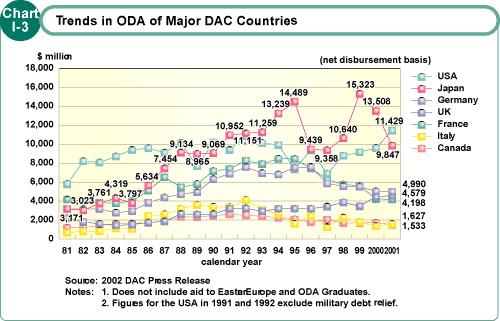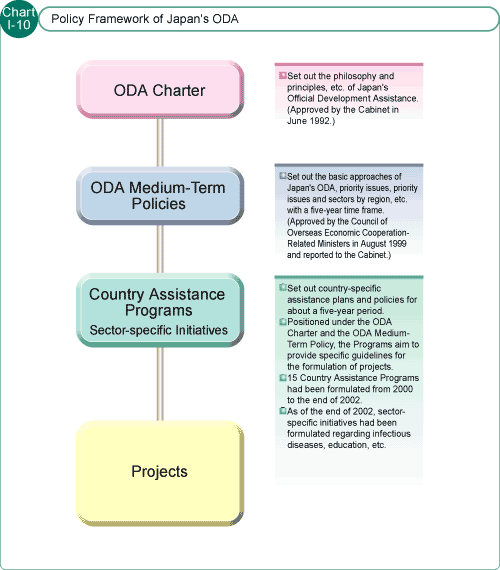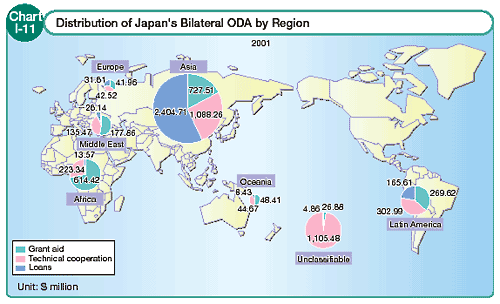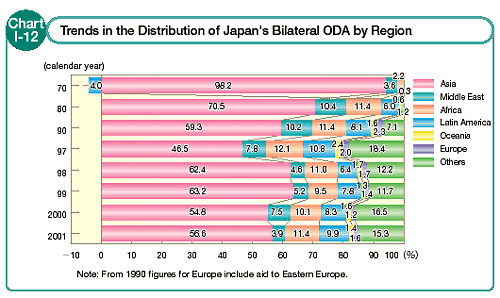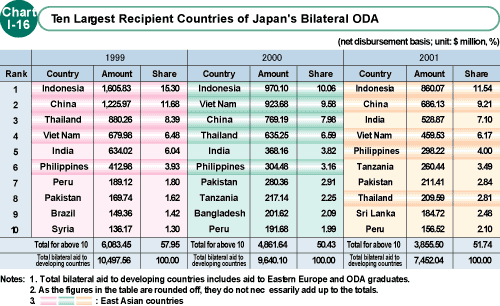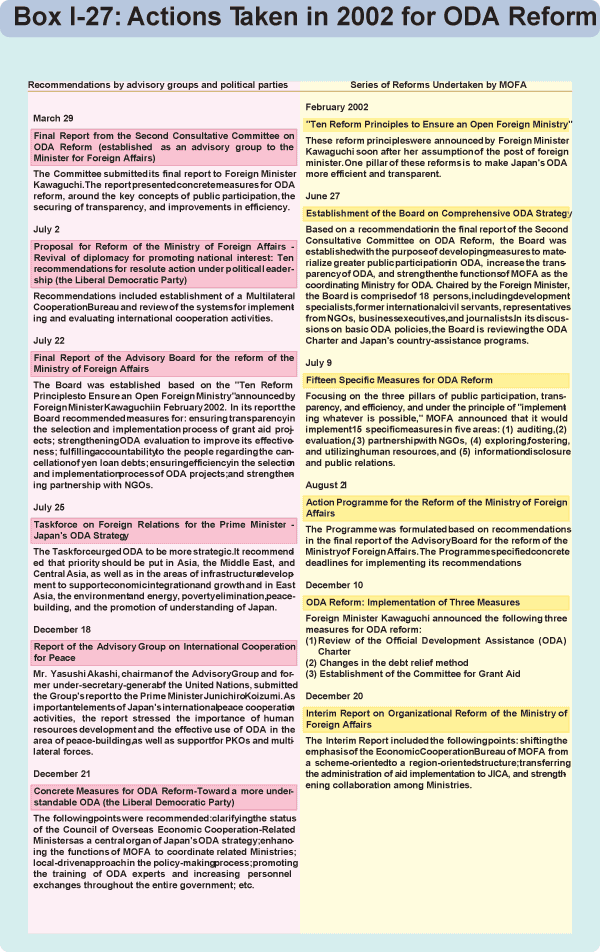Official Development Assistance (ODA)
Summary of the 2002 White Paper on
Official Development Assistance (ODA)
Ministry of Foreign Affairs
April 2003
Contents
Trends and Developments in Japan's ODA in the Rapidly Changing International Community
- Chapter 1 Development Issues as Major Challenges in the 21st Century
- Chapter 2 Japan's ODA to be more Strategic
- Chapter 3 Increasing Public Support and Participation--Further Promotion of ODA Reforms
- Chapter 4 New Trends in Japan's ODA
Trends and Developments in Japan's ODA in the Rapidly Changing International Community
Chapter 1 Development Issues as Major Challenges in the 21st Century
Bolstered by the efforts of the international community over the past several decades, social and economic statistics in developing countries have been improved in many respects. These countries still face many difficulties, however. In particular, because of the advance of globalization and the terrorist attacks in the United States in September 2001, the international community's concern about development issues has been increasing.
Section 1 Increased International Attention to Development Issues
- Economic disparities have been expanding and the problem of poverty has become more serious in the course of the advance of globalization. In addition, global issues, such as the environment and infectious diseases, remain serious. Furthermore, since the end of the Cold War, conflicts, particularly internal conflicts, have frequently arisen, and there have been increasing international efforts in the areas of conflict prevention, emergency humanitarian assistance, consolidation of peace and nation-building. The decreasing trends of private-sector investment in developing countries have also affected the development of these countries.
- In 2002 the United States and the EU announced large increases in their ODA.
[Chart I-3: Trends in ODA of Major DAC Countries (from ODA White Paper)] - The sharing of development goals and building of new development strategies have been furthered in the international community. In particular, the Millennium Development Goals (MDGs) set specific targets for achievement in such areas as poverty reduction, basic education, and health. Regarding development strategies, donor countries and international organizations have strengthened their partnership focusing on poverty reduction.
- Based on the belief that poverty reduction through economic growth is important, Japan has been cooperating to promote trade and investment through assistance in the economic sector.
Section 2 Series of International Conferences on Development
- Development was the main agenda at a series of international conferences held in 2002, including the International Conference on Financing for Development (March), the G8 Kananaskis Summit (June), and the World Summit on Sustainable Development (Johannesburg Summit) (August-September).
[Box I-2: Trends and Developments in ODA from the Period Around the September 11 Terrorist Attacks in the United States to the Present (from ODA White Paper)] - The following were the main issues at these conferences:
- Mobilizing financial resources for development through all available means, including ODA and private financing (investment and trade).
- Increasing aid effectiveness through the harmonization of aid procedures.
- Good governance in developing countries, including promoting democracy, ensuring the rule of law, and preventing corruption.
- Selectivity of aid implementation to developing countries.
- Partnerships with NGOs and the private sector.
- Japan has announced various initiatives, including the Koizumi Initiative which focuses on African development, education, and sustainable development. Despite a decrease in its ODA, Japan has furthered the prioritization and increased efficiency of its ODA assistance, addressed the debt issue, and strengthened partnerships with NGOs and other stakeholders in order to steadily implement the commitments reached at international conferences.
Chapter 2 Japan's ODA to be more Strategic
As international attention to development issues grows, it will be essential for Japan to articulate its ODA strategy with more focused priorities in order to utilize its ODA funds more effectively.
Section 1 Overview of Japan's ODA
- In terms of region-wise approach, Japan's ODA focuses on Asia, and Japan's assistance places importance on poverty reduction through economic growth and on capacity- and institution-building. In its implementation of ODA projects, Japan makes full use of its experience and know-how.
- Japan also attaches great importance to the utilization of ODA to promote peace and stability, the ensuring of human security, and the achievement of the Millennium Development Goals (MDGs).
- Japan is formulating country assistance programs and sector-specific initiatives based on Japan's ODA Charter and its Medium-term policy.
[Chart I-10: Policy Framework of Japan's ODA (from ODA White Paper)]
Section 2 Japan's ODA Extended to the World with a Focus on Asia
- Over half of Japan's ODA has been extended to East Asian countries. Through ODA projects, which are conducive to trade and investment, Japan has contributed to the remarkable growth of this region.
[Chart I-11: Distribution of Japan's Bilateral ODA by Region]
[Chart I-12: Trends in the Distribution of Japan's Bilateral ODA by Region]
[Chart I-16: Ten Largest Recipient Countries of Japan's Bilateral ODA] (All from ODA White Paper)
- China: In October 2001 Japan announced its Economic Cooperation Program for China. As a result of a substantial revision, the amount of Japan's yen loans to China in fiscal year 2001 decreased by around 25 % from the previous year.
- Southeast Asia: Aiming to strengthen its economic partnership with the region, Japan has been implementing Mekong basin development projects and providing support for policy-making.
- In August 2002 the Initiative for Development in East Asia (IDEA) Ministerial Meeting was held to build regional development cooperation and to propagate East Asia's experience to other regions of the world.
- Africa: Japan supports the New Partnership for Africa's Development (NEPAD), an initiative by the African countries themselves. In this regard, Japan is scheduled to host the 3rd Tokyo International Conference on African Development (TICAD III) in 2003.
- Other regions: Japan is extending necessary assistance based on the development needs and importance to Japan of each region.
Section 3 Cooperation for the Consolidation of Peace and Nation-building
- In a policy speech delivered in Sydney in May 2002, Prime Minister Koizumi announced Japan's intention to "strengthen cooperation for the consolidation of peace and nation-building in countries suffering from conflicts. This policy has become a new pillar of Japan's international cooperation."
- Japan has been making concrete efforts to promote the peace process and to support the public security sector, and provide humanitarian and rehabilitation assistance in East Timor, Afghanistan, Sri Lanka, Aceh in Indonesia, Mindanao in the Philippines, etc.
Section 4 Promotion of Human Security
- Based on the concept of human security, Japan is actively extending ODA in the areas of assistance to refugees and displaced persons, de-mining, education, health, and gender.
- As of the end of January 2003, 72 projects had been implemented through the Trust Fund for Human Security, and as of fiscal year 2001, Japan's contributions to the Fund totaled approximately 19 billion yen.
- In fiscal year 2003 Japan will introduce a new scheme of Grant Assistance for Grassroots Human Security Projects, by expanding the existing scheme of grant assistance for grassroots projects.
Section 5 Efforts to Achieve the Millennium Development Goals (MDGs) *
- For the achievement of the MDGs, Japan is strengthening its support addressing directly the social sector, while providing assistance to promote economic growth.
- Education: In June 2002 Japan announced its initiative for educational assistance. (Focusing on the universal basic education, Japan will provide ODA over the next five years amounting to more than 250 billion yen to give support to low-income countries.)
- Infectious diseases: Japan is steadily implementing the Okinawa Infectious Diseases Initiative, which the government announced in 2000.
- Environment: In August 2002 Japan announced its Environmental Conservation Initiative for Sustainable Development (EcoISD).
- Water and Sanitation: Taking into account the 3rd World Water Forum held in March this year and the G8 Evian Summit to be held in June, Japan has been bolstering its efforts in this sector. As part of these efforts, Japan and the United States jointly launched the Clean Water for People Initiative on the occasion of the Johannesburg Summit.
*The Millennium Development Goals set specific goals and targets to be achieved and time periods in such areas as poverty, education, health, gender, and the environment. They are an integrated and developed version of the key goals and targets set out in DAC's 1996 International Development Goals, the UN Millennium Declaration, etc.
Section 6 Promotion of International Collaboration
- As more efficient and effective assistance is being required to achieve the MDGs, Japan is enhancing policy consultations with recipient countries and other donor countries, as well as promoting collaboration with these countries and international organizations.
- Japan is actively supporting South-South cooperation, which is cooperation among developing countries themselves. To make use of Asia's development experience for the development of Africa, Japan is actively promoting Asian-African cooperation.
- Japan is holding close policy consultations with other donor countries. In addition, Japan is carrying out joint initiatives and projects with these countries.
- Japan is also carrying out policy dialogues and joint projects with international organizations, including the World Bank, the United Nations Development Programme (UNDP), and the United Nations Children's Fund (UNICEF).
Chapter 3 Increasing Public Support and Participation-Further Promotion of ODA Reforms
Section 1 Severe Domestic Conditions Surrounding ODA and the Acceleration of ODA Reforms
- As a result of the prolonged economic slump and worsening of Japan's fiscal situation, the domestic view of ODA is growing harsh. The ODA budget has been decreasing since fiscal year 1998, and the ODA budget for fiscal year 2002 showed a particularly sharp decrease of 10.3 % from the previous year.
- Since sources of ODA come from taxpayers, the understanding and support of the public for ODA are essential. In 2002 the Ministry of Foreign Affairs (MOFA) began to implement various specific measures for reforming Japan's ODA around the key concepts of transparency, efficiency, and public participation. The government also commenced efforts to develop its ODA policy to be more strategic.
[Box I-27: Actions Taken in 2002 for ODA Reform (from ODA White Paper)]
Section 2 Strengthening of ODA Policy-making Functions
- The government is strengthening collaboration among ODA-related government ministries and agencies. For this purpose, in addition to further utilizing the Council of Overseas Economic Cooperation-Related Ministers, the government in November 2002 launched the Experts Meeting on Financial Cooperation as a framework for overseeing the flow of assistance funds to recipient countries.
- In 2002 an extraordinary session of the Diet approved the Law Concerning the Independent Administrative Institution Japan International Cooperation Agency. Under this law, from October 1, 2003, JICA will execute its activities with more autonomy.
- In June 2002 the Ministry of Foreign Affairs established the Board on Comprehensive ODA Strategy inviting scholars, NGOs, businesspersons of high caliber to give advice to the government on country assistance programs, sector-specific prioritization, and other important ODA issues.
Section 3 Promotion of Public Participation in ODA
- The government is making efforts to strengthen partnerships with NGOs and local public bodies, explore, foster, and utilize human resources, and promote development education, information disclosure, and publicity.
- In 2002 the Ministry of Foreign Affairs strengthened the functions of the MOFA-NGO Regular Consultations and introduced regular consultation meetings at local level ("ODA-Embassy") among Japanese embassies, overseas offices of JICA and JBIC, and NGOs.
- From fiscal year 2002 the government introduced the Special Term for Economic Partnership (STEP) in relation to yen loans.
- MOFA also has launched the ODA Mail Magazine and begun holding ODA Town Meetings.
Section 4 Increasing Transparency and Efficiency in Each Stage of ODA Projects
- Japan is strengthening the transparency of its ODA through such measures as the disclosure of a long list of the future candidates projects for yen loans and holding of the Committee for Grant Aid.
- In April 2002 JBIC announced the JBIC Guidelines for Confirmation of Environmental and Social Considerations. JICA has been undertaking revision of its environmental guidelines.
- Procurement: Measures have been put into place to disqualify firms and parties engaged in impropriety or malfeasance from tendering and receiving contracts for ODA projects for certain periods.
- Auditing: The government has expanded the number of countries subject to a review of yen loan procurement procedures by external experts, begun auditing by third parties of grant aid projects, and introduced auditing conducted without prior notice. Mechanisms for the follow-up of auditing results have also been put in place.
- Evaluation: All ex-post evaluations included the viewpoints of third-party outsiders. Workshops were held to improve the ODA evaluation capabilities of recipient countries.
Chapter 4 New Trends in Japan's ODA
- In addition to moving further ahead with its ODA reforms, the Japanese government will place emphasis on its assistance to the Asian region, peace-building, human security, public participation in ODA, and aid visibility.
- It will also be necessary to further articulate both the philosophies and strategies of Japan's ODA. In December 2002 the Ministry of Foreign Affairs commenced a review of Japan's ODA Charter, which sets out core of Japan's ODA policies. In this review, particular attention is being paid to the following areas:
- Articulate the basic philosophy of Japan's ODA, including consideration of security and prosperity of Japan in addition to "universal values" such as humanitarian viewpoints.
- Prioritized implementation of ODA, based on emphasis on Asia, active use of ODA in peace-building, and concept of human security.
- Articulate measures for securing strategic, flexible, transparent and efficient implementation of ODA, including stipulating the policy-making/ implementing process and enhancing country assistance programs.
